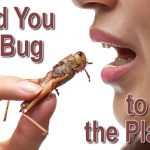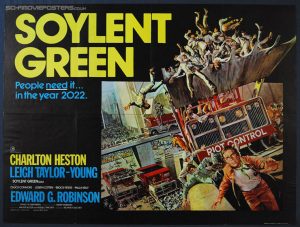
Would You Eat a Bug to Save the Planet?
To what extremes are we willing to go, to fit more and more people and bigger and bigger economies on a finite planet? It seems we’re willing to give up many freedoms, conveniences, safety and security, but we’re not willing to acknowledge we’re overpopulated or overconsuming. Addressing those root causes is not an option.
So, get ready to give up that dream home, meat, golf, rock concerts and air travel; and start whipping up a batch of cricket smoothies. In this episode of the GrowthBusters podcast, the team discusses the newest footprint-shrinking strategies and whether we’ll adopt them before things are “semi-apocalyptic.” How far will we go, before we’re willing to strongly suggest limiting our offspring and settling for a smaller, stable and sustainable economy?
Budding filmmaker Andrew Little filmed this podcast recording session and put together a very short video to help us spread the word about the GrowthBusters podcast:
 Kaitlyn and Ben hadn’t seen the 1973 sci-fi overpopulation flick, Soylent Green, so I shared a classic scene in which Charlton Heston and Edward G. Robinson practically climax over the taste of real food obtained on the black market. In this future, real food was one under-appreciated item sacrificed as the population grew way beyond the agricultural system’s ability to feed everyone.
Kaitlyn and Ben hadn’t seen the 1973 sci-fi overpopulation flick, Soylent Green, so I shared a classic scene in which Charlton Heston and Edward G. Robinson practically climax over the taste of real food obtained on the black market. In this future, real food was one under-appreciated item sacrificed as the population grew way beyond the agricultural system’s ability to feed everyone.
GrowthBusters is a public education project and documentary film. Our mission is to find the cure for growth addiction, so future generations can live decent lives on a planet with healthy life-support systems. Your comments are welcome below. Check out the documentary film, GrowthBusters: Hooked on Growth.
Subscribe to the podcast so you don’t miss an episode:
Links mentioned in this episode:
Video: Would You Eat Bugs for Protein?
Save the Planet, Eat an Insect by David Suzuki
GrowthBusters Podcast on Facebook
Tags: footprint, podcast, sustainability
Trackback from your site.







Connie Neff
| #
I have considered raising insects as a small business. (In fact it is already a very successful business world-wide) The space and resources you would need to get started are minimal and it would be a perfect small business that could be operated out of your home. We need to get over some of our preconceived ideas about “ickyness” and consider how to feed too many people. There are some excellent books out there on preparation, raising, but not so much marketing.
Reply
Luis Zardo
| #
No, we do not have to find ways to feed too many people, we need to find ways to effectively reduce our population, otherwise, it´s much better to simply let everyone starve to death.
Because it´s not just about food, we are about to loose everything that make living worthwhile
That´s not saying that, if we can find ways to use insects as food we should not do it, i´m completely ok with that, but not if it´s simply so as we can fit another dozen billion of us.
Reply
Brian Sanderson
| #
OK, farming bugs can likely produce a lot of protein and some good oil. So that just enables more population growth. The end result will be an even bigger slice of the planetary ecosystem that is gobbled up by an overrated specie of primate.
http://users.eastlink.ca/~bxs/eat_bugs.html
No, I correct myself. That’s not the end result. The end result is crowding, loss of freedoms and the end of agency. A small group animal gets pretty damned nasty under such circumstances.
If you want to know what overpopulation looks like, it looks like a continuation of present trends. No enough space and resources for the different tribes to give each other some space and a little dignity.
Reply
Dave Gardner
| #
While I would definitely rather see see us scale back our numbers and our hunger for economic growth, I didn’t envision eating insects as a way to feed MORE people. I saw insects as a substitute for livestock. Until we get human population back down to a sustainable level, we DO need to reduce per capita consumption of traditional meat, because it does consume so much water, produce so much methane, etc. If it were introduced ON TOP of our current consumption, just to enable population to continue growing or to stay at this unsustainable level, that would be tragic. Thanks for the good comments!
Reply
Brian Sanderson
| #
Hi Dave, I am deeply suspicious of the law of unintended consequences in this instance.
There is one overriding question that is seldom addressed. That is the question: What is the human breeding strategy?
Paul Colinvaux is the only scientist, that I know of, to address that question in a credible way. (In the process, he totally demolishes the usual arguments made by demographers and so forth.) The answer to that question is the anvil upon which all efforts will either succeed or fail, including eating bugs.
Reply
Dave Gardner
| #
Ah, yes! We are into the advanced class now. Can you share more about Colinvaux’s thinking?
Reply
Dariel Blackburn
| #
Thanks Dave. It is always an informative and entertaining time listening to you talk about overshoot. Your two sidekicks are really great and I love your exchange. You are gentle but prodding them to consider a future where govt might actually do the right thing and bring population under control. It is both scary and hopeful and interesting to look back and see that law makers have done some helpful things by legislating certain harmful practices. I look forward to Scottish style golf courses with no watering needs. 🙂 You are so committed to this campaign and I so admire you for the way you gently push forward, gently reminding us that we could live a better life if we were willing to confront overpopulation.
Reply